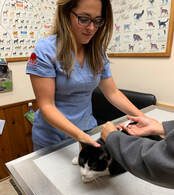
There is a surprising amount of misunderstanding surrounding pet microchips and why it is an important part of keeping your pet safe and healthy. It’s easy to assume you will never need to use one for your pet because they are always with you or never go outside without a leash. But the adage “Never say never” could not be any truer than when it comes to pets.
The statistics of lost pets in the United States are scary to look at. According to multiple studies, most pets that go missing never find their way home. According to one study published in the Journal of the American Veterinary Medical Association only 22 percent of lost dogs that entered animal shelters were returned to their owner. That’s barely over 1 in 5 dogs finding their way home from the shelter. Lost cats in that make it to an animal shelter have an even bleaker outlook. Less than 2 percent of them are reunited.
However, this study found that microchipped pets have a far greater chance of making it back home. Over 52 percent of microchipped dogs and 38 percent of microchipped cats are reunited with their families from the shelter. Another study found that an owner’s efforts to find their dog results in a recovery rate of only 13 percent. However, when a microchip is detected at an animal shelter the rate of return to owners jumps drastically to 74.1 percent.
Microchips help bring lost pet’s home but what are they and how do they work? The chip itself is tiny enough that getting it implanted doesn’t require anesthetic. It is like getting a routine vaccine. The microchip is placed just under the skin between the shoulder blades. The only information stored on the microchip is a unique identification number that when looked up in a database can identify your pet. The microchip is not a GPS chip so it cannot be used to locate your pet and it also does not store your personal contact information. The contact information that is given when registering the pet’s microchip is only given out when the veterinary service or shelter calls the pet recovery service after scanning a microchip.
Getting your pet microchipped is a great first step in making sure they always find their way home. Making sure to keep the contact information up to date with any new addresses and phone numbers will ensure that if your pet ever does get lost whomever finds them is able to get them home.

Recent Comments